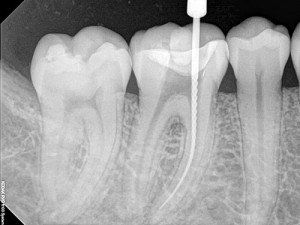Your Dental Health and Root Canals: 
Years ago, if you had a tooth plagued by a diseased nerve, the outcome was usually the same. The tooth could not be saved and would need extraction. Today, your tooth can be saved!
Using the dental procedure known as a root canal treatment, fewer and fewer individuals have to submit to tooth loss. Relatively straightforward procedures, root canals can be achieved quickly and with little or no discomfort. The entire procedure takes anywhere from one to three visits depending on your particular situation. Although you may cringe at the thought of a root canal, this minor procedure can save your tooth and preserve your smile!
Why Do I Need a Root Canal?
To adequately answer that question, we need to clear up some misconceptions about root canals and the tooth’s nerve function. Many people are surprised to learn that a tooth’s nerve is not critically important for the health or function of their tooth once it has broken through the gums. The only function that this nerve provides is sensory. It alerts you to sensations of hot or cold, but the existence or lack of a nerve does not affect the overall day-to-day function of the tooth.
So, why do you need a root canal if the nerve is not causing problems? The answer is that when a tooth has a deep cavity or becomes cracked in any way, this provides an opportunity for bacteria to move into the pulp tissues. Once bacteria have entered this part of the tooth, germs can create an infection within the tooth. Once the tissue is infected, it must be removed as soon as possible to prevent swelling and pain. Not only can an infection be painful, but it can progress, damaging your jawbone and become harmful to your overall health and wellness. Without a prompt response, the tooth may have to be extracted.
How Do I Know If I Need a Root Canal?
Surprising as it may seem, teeth that are in need of root canal therapy may not be painful. However, teeth do present certain signs that a root canal may be necessary such as the following:
• Severe toothaches
• Pain when chewing
• Pain when pressure is applied to the area
• Sensitivity or pain to hot and cold temperatures that are lengthy or reoccur frequently
• Discoloration of the tooth
• Tenderness or swelling in nearby gums
If you can relate to any of the above signs and symptoms of infection, call us right away for an appointment.
What Can I Expect during a Root Canal?
In general, root canal treatment can take anywhere from one to three visits to fully address the problem. During a root canal treatment, we will do away with the infected tissue. Once the infected tissue is removed, we will clean the inside of the tooth and apply a sealant. To finish, we will then use a dental composite to fill the tooth.
In cases where a tooth has extensive decay, we may recommend putting a crown on the tooth for added strength and protection. This crown can prevent your tooth from breaking in the future.
How Long Can a Restored Tooth Last?
The answer is indefinite. If you continue with good oral habits like flossing, brushing your teeth twice a day, and visiting your dentist once every six months, teeth restored with root canal treatment can last a lifetime.
For more information about root canals, call Dr. Lana Nguyen at Brandywine Dental Services Group in Glen Mills, PA, today.



